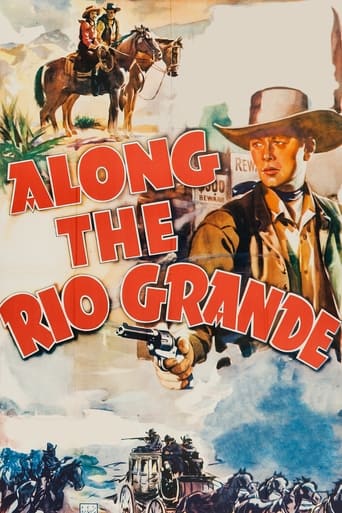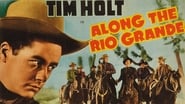jacobs-greenwood
Directed by Edward Killy, a Best Assistant Director Oscar nominee in 1934, this Tim Holt B Western was based on a story by Stuart Anthony; the screenplay was written by Morton Grant and Arthur V. Jones. Joined by his usual sidekicks, singer Smokey (Ray Whitley) and tall tale telling Whopper (played this time by Emmett Lynn), Holt plays Jeff, a trustworthy ranch hand whose boss Pop Edwards (Harry Humphrey) is murdered by rustler Doc Randall (Robert Fiske). Pop's murder inspires the three wrangler friends to help the sheriff (Hal Taliaferro aka Wally Wales) to apprehend Doc and his gang. Monte Montague plays Doc's right hand man Kirby.Because of an improbable turn of events involving banker Joe Turner (Carl Stockdale), Jeff, Smokey, and Whopper are put in jail overnight as bank robbers by the sheriff. Fortunately for these three, one of Doc's henchman Pete (Slim Whitaker) is already in the cell. After making their introductions, Pete informs them that he's about to be sprung so Jeff asks if he and his pals can come along. Pete then takes them to Doc's Mexican hideout, a Catina run by Paula (Ruth Clifford), and vouches for them. But Doc is not so sure until Mary Loring (Betty Jane Rhodes), who'd been in the jail at the time Jeff et al appeared to be robbing Turner's bank, verifies Pete's claim. Mary, who'd come south of the border to sing, tells Paula that she doesn't want to work in a place that caters to outlaws; she then realizes that she no longer has a choice in the matter.Suddenly, every job Doc's gang tries to run turns into an ambush; the Sweetwater sheriff seems to know their every move. But Doc continues to avoid capture by not participating in the action while Jeff is able to keep himself and his friends barely above suspicion. Eventually, however, Doc lays a trap that dim-witted Whopper falls for such that Ray and Jeff are put at risk. With help from Mary, who has naturally fallen for Jeff, Ray is able to escape to warn the sheriff. Of course, the posse arrives just in time to assist Jeff, who'd escaped Doc's clutches and then singlehandedly held the gang at bay with no more than his fists and a six-shooter.In the end, even Whopper contributes by keeping the outlaws from escaping on horseback.
JohnHowardReid
Young Tim Holt certainly kept busy in 1941. He appeared in no less than eight movies, including an uncredited role in a short, Know for Sure. Here has he has the starring role in a competent enough "B" western in which he seems content to allow the other players to steal most of his scenes, particularly garrulous Ray Whitley and even reluctant heroine, Betty Jane Rhodes. Actually, it's the villain – a doctor-turned-bad-guy and a real mean one – played by Robert Fiske who dominates the movie. The action scenes are lively enough, but nothing special, although locations are well utilized by director Edward Killy, who spent most of his career as an assistant director, both before and after his stint in the main job. This entry is available on an excellent Warner Archive DVD.
classicsoncall
I was left scratching my head early in the story when the buddy trio of Tim Holt, Ray Whitley and Emmett Lynn deposit twelve thousand dollars for their boss in the Sweet Water bank. A note signed by Pop Edwards requesting they bring it back is delivered by a young boy, but since the banker smells a rat he refuses to return the money, whereupon the boys take it back forcibly. This sets up a ruckus with banker Turner yelling the bank's been robbed and demanding that the men are jailed. The sheriff pretty much takes the boys' side, but jails them anyway to play it safe.Oh well, I guess it doesn't have to make much sense. These early oaters were put together quick and cheap, and sometimes in just one take. Throw in a pretty female (Betty Jane Rhodes) for a romantic interest and you were just about home free as the good guys save the day from the evil town boss. That's pretty much the story here. Tim Holt as the lead hero actually doesn't seem to have a lot to do, leaving the memorable moments to his sidekicks. Ray Whitley sings and yodels through a couple of tunes, while Emmett Lynn tells tall tales in the interest of promoting his own self importance. Keeping an eye out for those subtle bits that add some color to these old time Westerns, I got a kick out of signs in the local saloon promoting Old Mule Whisky and Red Rock Gin for ten cents, and Dead Man's Delight Lager Beer, a bargain at just a nickel!Tim Holt appeared in some of the coolest sounding Western titles of the '40's and '50's, with names like "Thunder Mountain", "Under The Tonto Rim", and "Wild Horse Mesa". "Along The Rio Grande" is one of his earliest, and it shows in his youthful good looks and smiling face. Not the worst way to while away an hour of your time, as long as you're not expecting "High Noon" or "Shane".
tankjonah
To avenge the death of their boss three men (Tim Holt, Ray Whitley, Emmett Lynn) pose as bank robbers to infiltrate the gang of the man (Robert Fiske) responsible so that they can bring him to justice. An interesting early western, one of the first of Holt's long career in the genre. There's very little that is inspired here, as there are numerous dull songs sang at the hideout to help pad the film out to feature length (for a B-film), and the story is fairly conventional and predictable. However, Holt and his friends infiltrating the gang is reminiscent of For a Few Dollars More (1965), as they try to do what they can to bring the gang down without giving themselves away. Also the fact that the hideout is a saloon 'over the border' is somewhat like Rancho Notorious (1952) another superior western. Having come before both those films, is it possible that this minor B-film had an influence on two of the more memorable films of the genre? The answer is probably not, but with Leone having seen countless westerns with the desire to incorporate key moments into his own films, it's possible. Overall, this is a passable western with Whitley doing an amusing job as a loquacious fibber.




